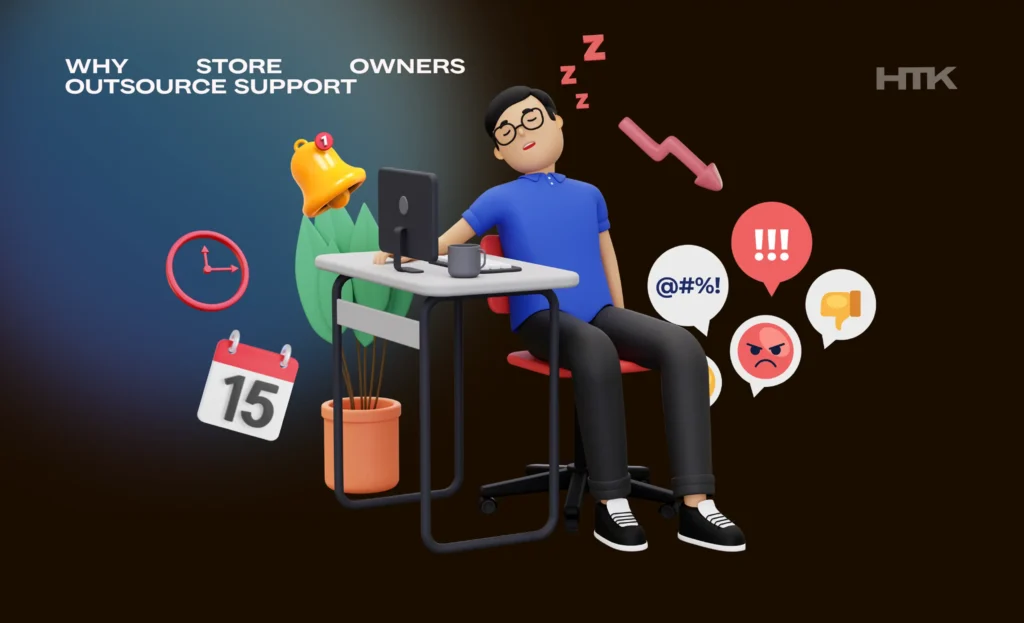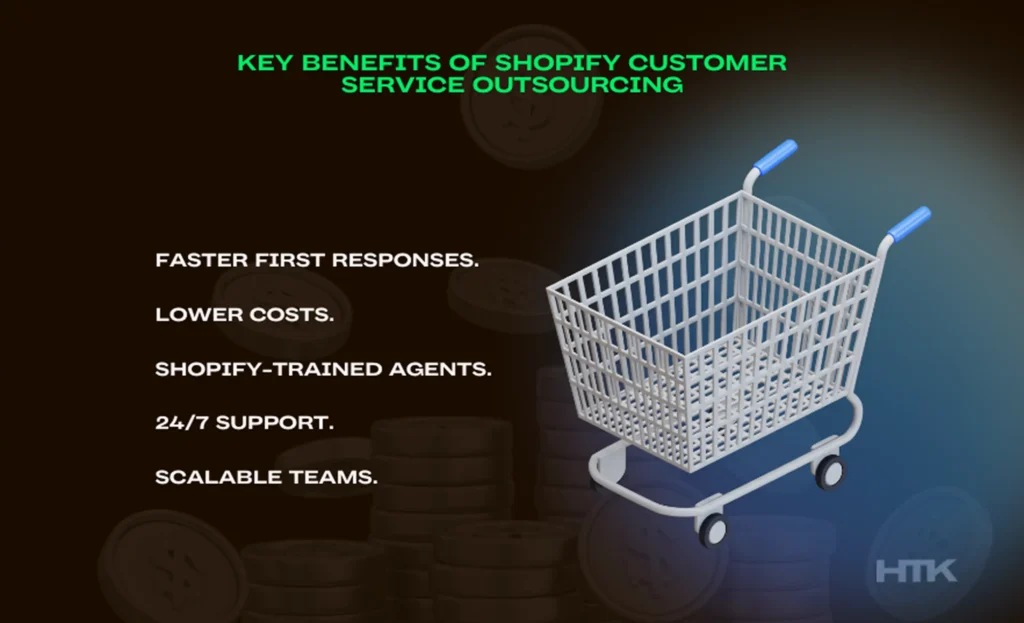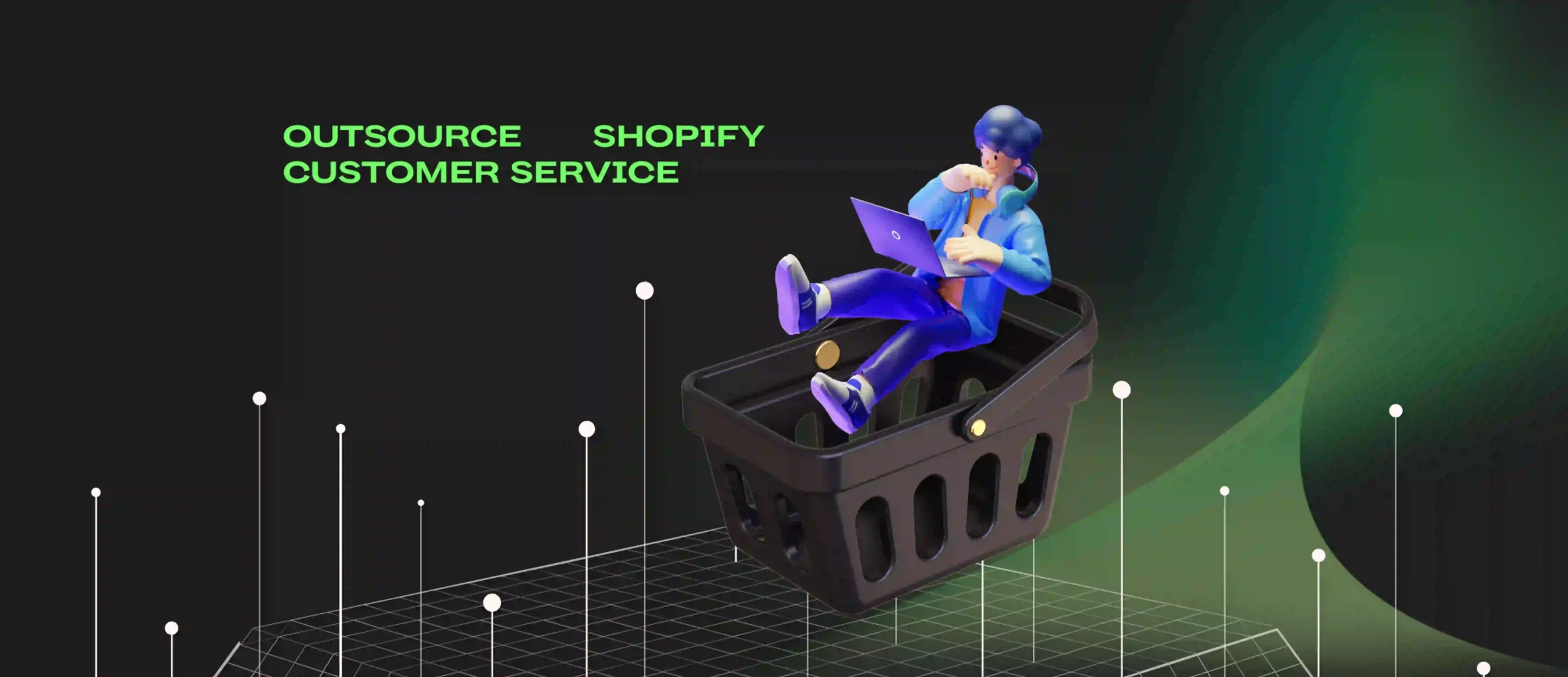Why and How to Outsource Shopify Customer Service
- What Does It Mean to Outsource Customer Service for Shopify?
- Why Shopify Store Owners Are Outsourcing Customer Support
- Key Benefits of Shopify Customer Service Outsourcing
- In-House vs. Outsourced Shopify Customer Support (Comparison Table)
- What Channels Can You Outsource on Shopify?
- What to Look for in a Shopify Customer Service Outsourcing Partner
- What Does a Shopify Outsourced Support Team Actually Do?
- How to Successfully Onboard an Outsourced Support Team
- Common Challenges and How to Avoid Them
- Real Examples: Who’s Already Doing This?
- How Much Does It Cost to Outsource Shopify Customer Service?
- When Should You NOT Outsource Shopify Support?
- Final Checklist Before You Outsource Customer Service on Shopify
- Final Thoughts: Is Shopify Support Outsourcing Right for You?
As the Shopify ecosystem continues to grow, so do the expectations of its customers. Whether you’re selling DTC skincare or custom electronics, providing fast, consistent support has become a non-negotiable. Yet for many store owners, scaling customer service is one of the most difficult parts of the business.
Outsourcing has become a go-to solution—not just to cut costs, but to increase performance, reduce ticket response times, and meet growing customer expectations. In this guide, we’ll explore what it means to outsource shopify development team merchants rely on, why it works, and how to do it right.
What Does It Mean to Outsource Customer Service for Shopify?
To outsource Shopify customer service means delegating your support channels—email, chat, social media, or phone—to an external team. This can be:
- A freelance support agent working solo
- A boutique agency that specializes in Shopify
- A Business Process Outsourcing (BPO) firm with global reach
The best choice depends on your brand’s complexity, ticket volume, and customer base. But in every case, Shopify customer service outsourcing is about letting trained professionals handle communication—while you focus on scaling your store.
Why Shopify Store Owners Are Outsourcing Customer Support

Shopify makes it easy to launch a store. But as traffic grows, so does support volume. Here’s why more merchants are turning to external teams:
- Support tickets grow faster than staff. Order issues, shipping delays, return requests—it all adds up.
- Support is multichannel now. Customers want help via email, live chat, Instagram, even SMS.
- Shoppers expect 24/7 responses. If you’re asleep, your competitors may not be.
- Every reply reflects your brand. One bad experience can mean a lost customer or a negative review.
To stay responsive while protecting brand reputation, outsourcing is a strategic move—not a compromise.
Key Benefits of Shopify Customer Service Outsourcing

Here’s what Shopify brands gain when they shopify outsource customer service to trained teams:
- Faster first responses. Outsourced agents work in shifts, covering time zones and reducing wait times.
- Lower costs. Pay for what you use, not for idle hours. Avoid hiring, onboarding, and training overhead.
- Shopify-trained agents. Many outsourcing teams know tools like Gorgias, Loop Returns, and Recharge inside out.
- 24/7 support. Serve global customers with rotating shifts or multilingual coverage.
- Scalable teams. Add or reduce agents as needed during promos, holidays, or growth phases.
In-House vs. Outsourced Shopify Customer Support (Comparison Table)
| Criteria | In-House | Outsourced |
| Cost | Higher (salary, benefits, training) | Lower (pay-per-ticket or hourly) |
| Speed | Limited to work hours | 24/7 availability |
| Coverage | One timezone/language | Global, multilingual options |
| Scaling | Slow, requires hiring | Flexible team scaling |
For startups and scaling brands, outsourcing usually wins on cost and flexibility. In-house works better when brand tone is ultra-specific or volume is low.
What Channels Can You Outsource on Shopify?
Most outsourcing providers support multiple communication channels:
- Email (standard and templated replies)
- Live chat via Gorgias, Re:amaze, Zendesk, etc.
- Social DMs (Facebook, Instagram, Twitter)
- SMS responses
- Post-purchase follow-ups or surveys
- Phone support (optional but available)
Omnichannel coverage ensures your customers get help wherever they reach out.
What to Look for in a Shopify Customer Service Outsourcing Partner
Not all outsourcing partners are the same. Here’s what to prioritize when selecting a Shopify customer service outsourcing provider:
- Platform fluency: They should understand Shopify’s admin, Gorgias, Recharge, Loop, etc.
- Helpdesk experience: Can they create macros, tags, and handle escalations properly?
- Subscription logic: Familiarity with recurring orders and cancellation flows
- Return/refund support: Policy-based and empathetic issue handling
- Brand voice adaptation: Can they match your tone and culture?
- SLAs and KPIs: Agree on first response times, resolution times, and CSAT metrics.
What Does a Shopify Outsourced Support Team Actually Do?
They’re not just answering emails—they’re keeping your store running smoothly. Typical tasks include:
- Handling “Where’s my order?” (WISMO) inquiries
- Explaining product specs or sizing
- Initiating refunds or exchanges
- Tagging and escalating tickets when needed
- Upselling loyalty programs or subscription plans
They become a true extension of your internal team—without sitting in your office.
How to Successfully Onboard an Outsourced Support Team
A good onboarding process is key to success. Steps to get started:
- Write clear documentation (FAQs, tone guides, escalation rules)
- Set up your helpdesk (Zendesk, Gorgias, etc.) and create macros
- Grant Shopify access (limited to order lookup)
- Start in “shadow mode” — let them observe before replying
The smoother the onboarding, the faster they’ll start driving real value.
Common Challenges and How to Avoid Them
Outsourcing isn’t risk-free. Watch out for:
- Brand misalignment: solved by tone guides, examples, and roleplay sessions
- Miscommunication: fix with Slack, weekly check-ins, shared dashboards
- Inconsistent quality: use CSAT surveys and random QA audits
Successful outsourcing = clear expectations + ongoing feedback.
Real Examples: Who’s Already Doing This?
Thousands of Shopify brands use outsourced customer support. Examples include:
- Beauty brands needing weekend or holiday coverage
- Fashion stores handling international returns
- DTC electronics with high ticket volumes post-launch
Whether via a small agency or a global BPO, these stores serve customers faster—without building huge support teams.
How Much Does It Cost to Outsource Shopify Customer Service?
Pricing depends on the model and provider:
- Pay-per-ticket: $1.50–$3.50 per ticket
- Per-agent hourly: $7–$20+/hr (depending on region, language, time zone)
- Hybrid: base retainer + ticket volume
Case in point: A mid-size DTC brand saved over $60,000/year by outsourcing instead of hiring three full-time agents.
When Should You NOT Outsource Shopify Support?
In some cases, outsourcing isn’t the right fit—yet:
- You get fewer than 30 orders/day
- Your products require deep, technical knowledge
- You manage VIP or concierge clients with high-touch needs
For these situations, keep it in-house—or use outsourcing only for basic support and escalation triage.
Final Checklist Before You Outsource Customer Service on Shopify
- Is your support volume steady enough to outsource?
- Do you have a written FAQ and tone of voice?
- Is your helpdesk (like Gorgias or Zendesk) ready?
- Are you ready to train a partner?
If you answered “yes” to most of the above, you’re ready to make the switch.
Final Thoughts: Is Shopify Support Outsourcing Right for You?
Outsourcing isn’t just about saving money. It’s about building a responsive, scalable brand that can serve customers 24/7 without sacrificing quality. For most growing Shopify brands, it’s not a question of if—but when.
Whether you need basic helpdesk coverage or full-service support, finding the right partner can unlock huge value.
Ready to talk Shopify support? Let’s build a smarter support operation—together.

Free website strategy session with a senior web expert
For over a decade, we’ve helped startups, SaaS companies, and service brands build high-performing websites that drive real results. Whether you’re planning a redesign, launching a new product, or need to scale your platform—our technical and UX expertise can help you move faster and smarter.
Ready to talk? Connect with a lead developer at Hutko.dev for a FREE 30-minute strategy call. Let’s map out your next step, together.
Book a Free Call





